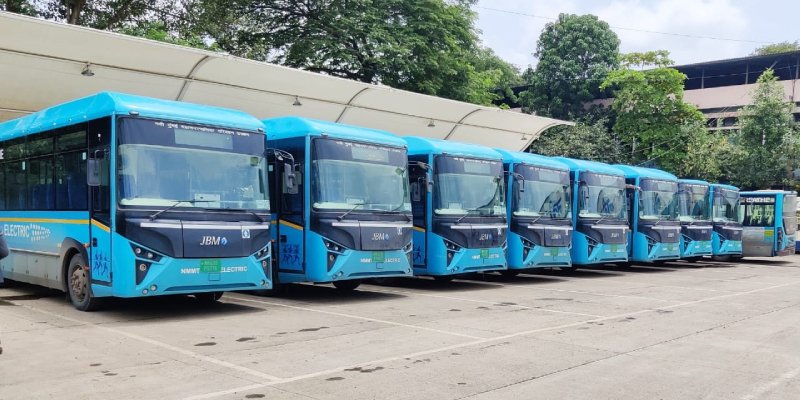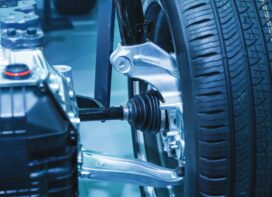The Government of India’s concerted efforts to electrify India’s public transport, amplified by the recent incentives provided by the Department of Heavy Industries (DHI), have empowered states like Maharashtra, Uttar Pradesh and Gujarat to scale the deployment of electric buses across cities.

As on June 30, 2022, over 2,508 e-buses were operational across 40 Indian cities. Of the total e-buses currently deployed in the country, 425 have been sanctioned under the Faster Adoption and Manufacturing of Electric Vehicles in India (FAME) Scheme-I, 1,785 have been sanctioned under FAME-II, and 298 buses have been deployed through state incentives.
The top three states leading e-bus deployment – Maharashtra, Gujarat and Uttar Pradesh – account for nearly 72% of the total e-buses currently operational in the country.
Among Indian cities, Pune (455 e-buses, ~18.14%), Mumbai (386 e-buses, ~15.39%) and Ahmedabad (202 e-buses, ~8.05%) are leading the transition, having increased their fleets three-fold over the past year.
On the other end of the spectrum, Thiruvananthapuram (10 e-buses, ~0.40%), Silvassa (14 e-buses, ~0.56%) and Nagpur (15 e-buses, ~0.60%) have been sluggish in setting the pace for bus electrification.

Maharashtra
Maharashtra’s EV policy 2021 aims to achieve 25% electrification of public transport by 2025. Mumbai is targeting the electrification of 21,00 standard and 900 double-decker buses by 2023, in a phased manner, while pushing for 50% electrification of public transport by 2024 and complete electrification by 2027.
Of the 1,036 (41.31%) e-buses currently deployed in Maharashtra, Mumbai runs 386 e-buses (15.39%) – leading the electric mobility transition of the state. Other cities following the lead are Pune (455 e-buses, ~18.14%), Navi-Mumbai (180 e-buses ~7.18%) and Nagpur (15 e-buses, ~0.60%).
The Maharashtra EV policy plans to achieve 25% electrification of public transport by 2025 across five targeted urban agglomerations – Greater Mumbai, Pune, Nagpur, Nashik and Aurangabad. The Maharashtra State Road Transport Corporation also plans to convert its existing bus fleet to 15% electric by 2025.
Uttar Pradesh
The state’s Directorate of Urban Transport (DUT) has recently deployed 389 e-buses across 15 cities. Besides Lucknow, e-buses are now also operational in Kanpur, Varanasi, Meerut, Ghaziabad, Gorakhpur, Prayagraj, Bareilly, Moradabad, Jhansi and Aligarh. Uttar Pradesh plans to induct an additional 1,000 e-buses and achieve 70% public transport electrification on pre-identified green routes in 10 cities by 2030.
Gujarat
Gujarat has its own operating model with diverse original equipment manufacturers (OEMs) working towards electrifying the public transport fleet in various cities by 2024. Gujarat’s urban local bodies are privy to an additional Viability Gap Funding (VGF) of 50% (up to Rs. 12.50/km). This fiscal support has enabled cities like Ahmedabad, Surat and Rajkot to make ambitious plans for public transport electrification. Gujarat also plans to become a global hub for renewable energy sector in the next 3-5 years with renewable energy sources expected to surge beyond 38,000 MW by 2025 and 61,000 MW by 2030.
Ahmedabad recently added 150 e-buses (90 from JBM and 60 from Tata Motors) to its fleet while Surat has 75 e-buses and plans to add a total of 150 e-buses by 2022. Rajkot is a relatively new entrant having inducted 38 e-buses to its fleet as of 30th June 2022.

Notable cities for public transport electrification
With an enthusiastic push towards electrification of public transport, cities like Mumbai, Ahmedabad, Bengaluru and Delhi are leading the change with operational fleets supported by FAME, state subsidies and VGF.
Bengaluru, with 90 operational buses currently, has targeted to deploy 300 e-buses by 2022 and 1,500 by 2024 with the complete electrification target year of 2030. Ahmedabad targets complete electrification of public transport by 2024.
The national capital of Delhi has already taken a giant stride towards bus electrification with the addition of 150 e-buses to its fleet. Delhi plans to deploy another 1,500 e-buses by September 2023.
Journey ahead
The Convergence Energy Services Limited (CESL), a subsidiary under the Ministry of Power, has boosted the adoption of e-buses by homogenizing demand across five Indian cities under the Grand Challenge 1.0. The recently concluded challenge for 5,450 e-buses resulted in the lowest-ever prices for 12-m (Rs. 43.49 per km) and 9-m (Rs. 39.21 per km) buses. After its phenomenal success, CESL is now planning Grand Challenge 2.0 wherein 50,000 e-buses will be procured through multiple tenders for Tier I, II & III cities over the next five years. Demand aggregation under this challenge has given OEMs an opportunity to bid aggressively as economies of scale now allows them the flexibility to develop and procure parts locally. Grand Challenge 2.0 will also help new manufacturers invest in India – creating investment and employment opportunities in the transport industry.

Aparna Vijaykumar, Program Manager (Electric Mobility), Yash Singh Program Associate (Sustainable Cities) Sanjay Bhatia, Senior Consultant with the Sustainable Cities and Transport Program, World Resources Institute (WRI) India
 TrafficInfraTech Magazine Linking People Places & Progress
TrafficInfraTech Magazine Linking People Places & Progress



